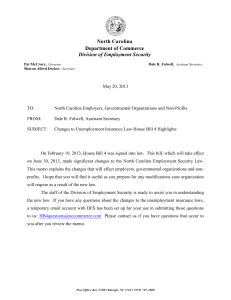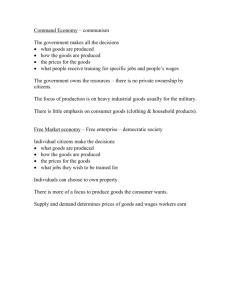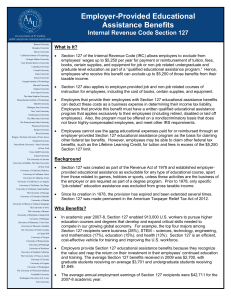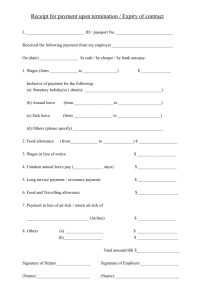North Carolina Department of Commerce Division of Employment Security
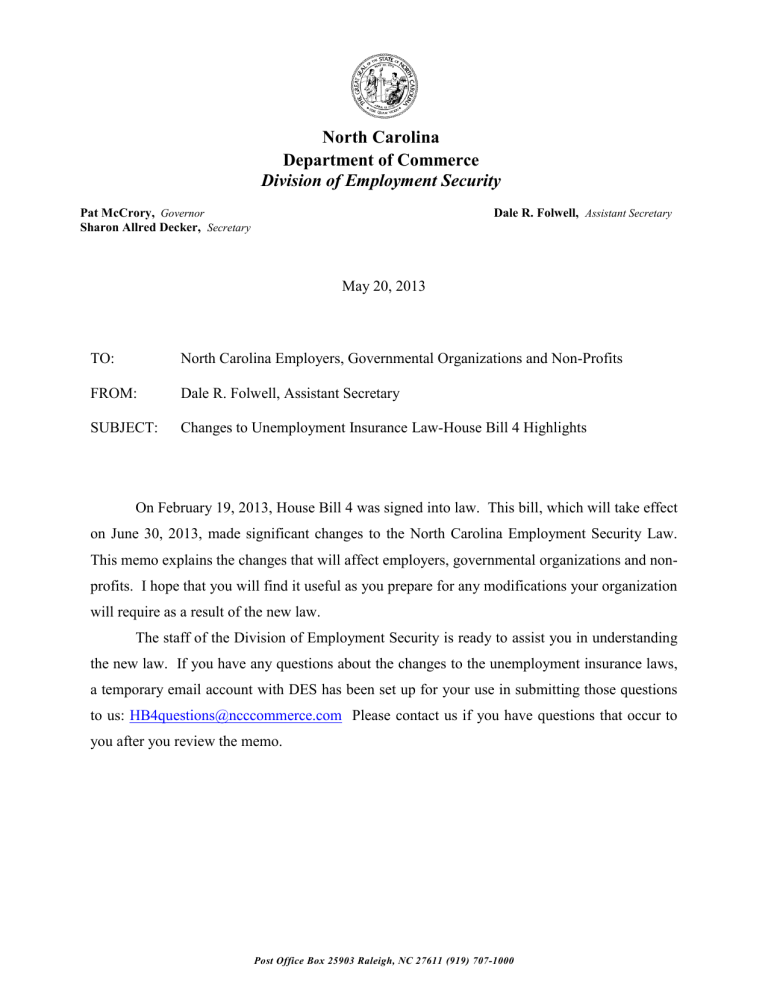
North Carolina
Department of Commerce
Division of Employment Security
Pat McCrory, Governor
Sharon Allred Decker, Secretary
Dale R. Folwell, Assistant Secretary
May 20, 2013
TO:
FROM:
North Carolina Employers, Governmental Organizations and Non-Profits
Dale R. Folwell, Assistant Secretary
SUBJECT: Changes to Unemployment Insurance Law-House Bill 4 Highlights
On February 19, 2013, House Bill 4 was signed into law. This bill, which will take effect on June 30, 2013, made significant changes to the North Carolina Employment Security Law.
This memo explains the changes that will affect employers, governmental organizations and nonprofits. I hope that you will find it useful as you prepare for any modifications your organization will require as a result of the new law.
The staff of the Division of Employment Security is ready to assist you in understanding the new law. If you have any questions about the changes to the unemployment insurance laws, a temporary email account with DES has been set up for your use in submitting those questions to us: HB4questions@ncccommerce.com
Please contact us if you have questions that occur to you after you review the memo.
Post Office Box 25903 Raleigh, NC 27611 (919) 707-1000
Significant Changes to Chapter 96
Employment Security Law
Session Law 2013-2 (House Bill 4)
The following provisions regarding unemployment insurance (UI) benefits take effect with the week beginning Sunday, June 30, 2013.
Attached Claims for Benefits: o Employers with a negative balance are required to bring the balance up to zero before an attached claim is submitted. o Employers are required to prepay the full amount of unemployment benefits payable to the employee before the claims are processed.
Payments must be received and cleared prior to benefits being disbursed to the claimant. o Employers will have 14 calendar days to prepay estimated benefits after claim request is made. o Funds collected from employers will be posted directly to a special account for prepayment. o Employers may only file one attached claim per employee per benefit year. o The period of attached unemployment for which the claim is filed may not exceed six consecutive weeks. o Employers will be reimbursed for unused prepaid amounts by calculating prepaid amounts minus benefits actually paid.
Waiting Week – A waiting week is now required for each claim filed during a benefit year. An individual currently serves one waiting week per benefit year.
Benefit Changes : o The maximum weekly benefit amount for new claims effective on or after June 30,
2013, is $350.00. The current maximum weekly benefit amount is $535.00. The maximum earnings allowance for any claim effective on or after June 30, 2013 is $70.00. o The maximum duration for unemployment benefits is reduced from 26 weeks to 20 weeks. The duration will be tied to the seasonally adjusted unemployment rate. The lower the state’s unemployment rate, the lower the duration for unemployment benefits.
Reduced Work Hours – An individual may qualify for benefits if he leaves work solely due to the individual’s work hours having been reduced more than 50% as part of a unilateral and permanent reduction in work hours. Currently, a reduction of 20% is needed to qualify.
Suitable Work – After the 10 th
week of a benefit period, any employment offer paying 120% of the individual’s weekly benefit amount is considered suitable work.
2 Division of Employment Security, NC Department of Commerce
Good Cause for Leaving Work – The law eliminates all but two of the specific reasons for which an individual could quit work and still qualify for UI benefits. Those two reasons are domestic violence and military spouse relocation. An employer’s account is not charged in these circumstances. Any individual may qualify for benefits if he can prove he left work for good cause attributable to the employer.
Quarterly Filing of NCUI 101 – Employers with 25 or more employees (including their payroll services) are required to file quarterly reports in a format prescribed by the Division of
Employment Security (DES). This format does not include paper. Penalties will be assessed for non-compliance.
Severance Pay
– Severance pay is treated in the same manner as other separation pay. Severance pay is no longer waived due to an individual’s school attendance.
Changes to the 500AB – Employers will have 14 days to return a completed Request for
Separation Information from Employer form (NCUI 500AB) to the Division. Claimants will not start receiving benefits until the NCUI 500AB is returned or the 14 days expires.
Effective October 21, 2013:
No Relief of Benefit Charges for errors resulting from non-compliance – If an employer or the employer’s agent has a pattern of failing to respond timely or adequately to any written request for separation information, such as the NCUI 500AB, the employer’s account may not be relieved of charges for benefits erroneously paid to the individual. o To determine if a response is adequate, DES will consider what information was specifically requested and whether the response is sufficient to satisfy the request. In addition to completing all appropriate areas of the Request for Separation Information from Employer form (NCUI 500AB), an employer should provide copies of warnings, policies, handbooks, documents or other information related to the claim. In short,
“adequate” responses provide sufficient facts to enable DES to make a correct determination under the law without having to contact the employer to obtain any additional information. The separation information must also be received timely. o A pattern of failing to respond timely or adequately to requests for information from the
Division relating to claims may be determined if the number of untimely/inadequate responses is 2 or more or equal to or greater than 2% of the total requests sent to the employer during the prior year, whichever is less.
Information for Governmental Reimbursable Accounts
Beginning with new law changes effective June 30, 2013, all governmental reimbursable accounts will be required to maintain an account balance reserve of 1% of annual reported taxable wages. Agencies will make four quarterly payments in order to build their reserves. Existing agencies will have a transition period in fiscal year 2013/2014 providing for them to build their reserves and to also reimburse DES for any benefit charges to their accounts. The transition period is indicated below:
3 Division of Employment Security, NC Department of Commerce
o Payment of 1% tax with quarterly reports: under the new law all existing agencies will make a 1% payment on taxable wages with their quarterly wage reports for 3Q2013
(due 10/31/13), 4Q2013 (due 1/31/14), 1Q2014 (due 4/30/14) and 2Q2014 (due 7/31/14).
Taxable wages are determined on a calendar year basis. Historically, a majority of organizations report most of their taxable wages during the 1 st
and 2 nd
quarters of each year. The example below demonstrates how taxable and excess (nontaxable) wages are computed.
Example ( for illustration purposes only ): An employer reports one employee who earns $10,000 per quarter. The taxable wage base for this illustration is the 2013 wage base of $20,900.
Wages Paid Subject to the Law
1st 2nd 3rd 4th
$10,000 $10,000 $10,000 $10,000
- Excess Wages (non-taxable wages) 0 0 $ 9,100 $10,000
= Wages Subject to Tax $10,000 $10,000 $ 900 0 o Payment of benefit charges: In 2013, benefit charges will be sent to agencies as they have traditionally been sent under the current law. The statute requires that annual charges be billed by 1/1/14 but historically, annual charges are billed sometime during the month of November. NOTE: The due date will be 30 days after the billing date rather than the 60 days allowed under current law. o Annual reconciliation of accounts beginning in 2014: There will be an annual reconciliation of each reimbursable account beginning in the fall of 2014. Annual benefit charges will be applied to the account and the employer will be billed for an amount which will bring its account balance to 1% of the most recent fiscal year’s taxable wages.
If an account has a balance in excess of the required 1%, the credit balance will be retained in the account and no refunds will be issued.
120% reimbursable accounts are being eliminated.
Governmental accounts that have noncharging rights and reimburse benefit charges at 120% will be deactivated effective 6/30/13 and new UI tax account numbers will be issued to these agencies effective 7/1/13 .
o These newly issued accounts will be 100% reimbursable accounts and will not be eligible to receive non-charging of benefits for any claims filed with benefit year beginning date on or after 6/30/13.
o The quarterly 1% tax payments required to be submitted beginning with the 3Q2013 report filing, will be submitted under these new account numbers (quarterly taxes will not be submitted under the “old” 120% reimbursable account numbers).
o Benefit charges for claims filed under the “old” account number will continue to be billed to the “old” account on an annual basis at 120%. Any claims that were filed under this account will still be eligible to receive non-charging of benefits.
o The annual reconciliation process beginning in fall 2014 will be on the newly issued
100% reimbursable accounts and not on the deactivated 120% accounts. The deactivated
120% will be responsible for benefit charges but they will not have any reserve requirements.
4 Division of Employment Security, NC Department of Commerce
All newly issued governmental reimbursable accounts must also maintain an account balance of
1% annual taxable wages and should contact DES for any guidance needed in meeting those requirements.
Approximate Schedule for Implementing Changes:
July 2013 New account numbers are assigned to agencies which currently have 120% reimbursable accounts
October 2013
November 2013
December 2013
January 2014
April 2014
July 2014
November 2014
December 2014
First 1% tax payment due based on 3Q2013 taxable wages
Annual claims reimbursement bills mailed out
Annual claims payments due
Second 1% tax payment due based on 4Q2013 taxable wages
Third 1% tax payment due based on 1Q2014 taxable wages
Fourth 1% tax payment due based on 2Q2014 taxable wages
2014 annual reconciliation of accounts and billings are mailed to employers
2014 annual reconciliation payment due
Information for Nonprofit [501(c)(3)] Organizations Reimbursable Accounts
After July 1, 2013, a nonprofit organization will not be able to secure its election to reimburse by posting a surety bond or a line of credit.
A bond or letter of credit that is currently in effect will be allowed to stay in effect until its expiration date. After the expiration date, a nonprofit reimbursable account will be required to maintain an account balance reserve of 1% of reported yearly taxable wages. Employers will make four quarterly payments in order to build their reserves. o Employers with bonds or letters of credit that expire 12/31/2013 will be required to submit payments equal to 1% of taxable wages with their quarterly reports for 1Q2014
(due 4/30/14), 2Q2014 (due 7/31/14), 3Q2014 (due 10/31/14) and 4Q2014 (due 1/31/15). o Employers with bonds or letters of credit that expire 12/31/2014 will be required to submit payments equal to 1% of taxable wages with their quarterly reports for 1Q2015
(due 4/30/15), 2Q2015 (due 7/31/15), 3Q2015 (due 10/31/15) and 4Q2015 (due 1/31/16).
Annual Reconciliation of Accounts for Employers with Bonds or Letters of Credit: o Employers with bonds expiring in 2013 : Since the employer will not have yet met its obligation to submit four quarterly reserve payments in 2014, at that year’s reconciliation it will be billed for the lesser of benefit charges or its negative account balance. For the annual reconciliation in 2015, the employer will be billed the amount necessary to bring its account balance to 1% of the previous fiscal year taxable wages after benefit charges are applied to its account.
5 Division of Employment Security, NC Department of Commerce
o Employers with bonds expiring in 2014 : Since the employer will not have yet met its obligation to submit four quarterly reserve payments in 2015, at that year’s reconciliation it will only be billed for the lesser of benefit charges or its negative account balance. For the annual reconciliation in 2016, the employer will be billed the amount necessary to bring its account balance to 1% of the previous fiscal year taxable wages after benefit charges are applied to its account.
Note: Effective with the 2013 annual reconciliation bills, the due date will be 30 days after the billing date rather than the 60 days allowed under current law. This law change applies to all reimbursable accounts.
Under the new law all new reimbursable accounts will be required to submit quarterly payments of 1% of taxable wages during the first four quarters following an election to be a reimbursable employer.
A temporary email address has been set up for additional questions related to
Session Law 2013-2 (House Bill 4). Please direct your questions to:
HB4questions@nccommerce.com
6 Division of Employment Security, NC Department of Commerce
